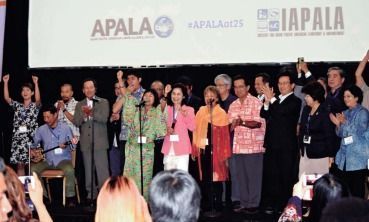660,000 members of Asian-American Labor Group add their voices to the calls opposing the Henoko Base construction

The All Okinawa Council introducing Okinawan music at the APALA Anniversary dinner. August 19, Anaheim California
August 27, 2017 Ryukyu Shimpo
By Washington Correspondent Yukiyo Zaha
“American base expansion and the militarization of Okinawa by the Abe and Trump administrations must be stopped!”
These words, spoken by Kent Wong, head of the UCLA Labor Center and one of the founders of the Asian Pacific American Labor Alliance (APALA), in the convention hall at APALA’s 25th anniversary convention in Anaheim, California.
At the convention, which received the second delegation from the All Okinawa Council (led by Councilor Yoichi Iha), a resolution showing solidarity with the people of Okinawa, and opposing new base construction in Henoko and Takae, was passed to the applause of over 600 participants.
70% are immigrants
A similar resolution was also proposed by Wong in 2015.
His involvement in the base construction problem began when visiting Henoko on the invitation of Okinawan labor unions.
Wong was moved by the sight of continued demonstrations outside the gates of the base, day after day.
“In the home of the peace-loving Okinawans, powerful forces move to expand bases, yet the people on the small island continue to protest the Japanese and U.S. governments, two of the most powerful in the world.
Now more than ever we must show our solidarity for peace,” said Wong.
With just over 20 chapters in the U.S., APALA is a labor union that brings with it the influence of around 660,000 voices.
Around 70% of its members are immigrants from the Asia-Pacific region from countries such as China, South Korea, and Vietnam.
The Trump regime has expanded policies that oppress the rights of labor unions and immigrants, and has emboldened the actions of racist organizations.
At the convention, protesting against Trump and racism were major themes.
The convention also passed a resolution in opposition to the administrations proposed border wall.
Not someone else’s problem
Wong’s speech was echoed by many others at the convention.
Darren Shiroma, a fourth-generation Okinawan whose father’s side hailed from Nishihara, spoke after a separate meeting held by All Okinawa.
“My grandparents thought of Okinawa with pride, and it had a great influence on my values, ideals, and beliefs.
The costs of the new base construction are being paid by U.S. tax dollars.
Everyone needs to stand up and urge Congress to oppose new base construction in Okinawa.”
Edisa Adams, of Philippine and Fukuokan Heritage, felt great anger at the sexual assault by U.S. military reported at the All Okinawa meeting.
Taking with her from the meeting a DVD and pamphlet from Okinawa, Adams said she would, “tell people back home about Okinawa, and that they must act now,” and that she would strongly call Congress to action in her role as the representative of a labor union with over 10,000 members.
The Americans empathetically regarded Okinawa’s problems as “our problem as well,” as democracy’s power for action was on full display at APALA.
Councilor Iha commented, “I want to use this resolution to lobby the Japanese and U.S. governments to action.
” The power of the people crosses international borders, and is driving calls to political action in both Japan and the U.S.
(English translation by T&CT and Sam Grieb)
Previous Article:MOD reveals that Japan’s Self-Defense Forces conducted drills 13 times in the NTA
Next Article:ANA International Logistics Hub to end Saturday shipping and suspend flights from Qingdao and Xiamen to improve profits
[Similar Articles]
- APALA adopts resolution against military expansion in Okinawa at 2017 Anaheim convention
- Largest US federation of trade unions pledges support in struggle against new US base
- Retired U.S. military members oppose new base construction, calling for a halt in Henoko and Takae for the 2nd straight year
- U.S. veterans’ group passes resolutions calling for abandonment of base construction at Henoko and Takae
- All Okinawa Council delegation to US meets with citizens’ groups, conveys opposition to base construction
 Webcam(Kokusai Street)
Webcam(Kokusai Street)


